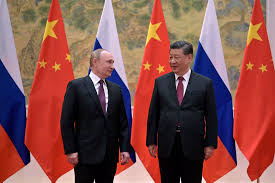Free Courses Sale ends Soon, Get It Now


Free Courses Sale ends Soon, Get It Now



Disclaimer: Copyright infringement is not intended.
Context:
Main takeaways from the visit:
|
Sino-Russian Historical Context: ●During the Cold War, China and the USSR were rivals, competing for control of the global communist movement. Tensions between the countries rose dangerously in the early 1960s, and they fought a brief border war in 1969. ●The relationship began to improve after the death of Mao in 1976 but remained still right until the collapse of the Soviet Union in 1991. ●In the post Cold War-era, economic relations formed the “new strategic basis” for Sino-Russian relations. China became Russia’s biggest trading partner and the largest Asian investor in Russia. China views Russia as a powerhouse of raw materials and a valuable market for its consumer goods. |
Conclusion:
Source:
https://indianexpress.com/article/explained/xi-putin-and-the-world-9333972/
Must read article:
https://www.iasgyan.in/ig-uploads/pdf/rstv21.pdf
|
PRACTICE QUESTION Q. The growing relationship between Russia and China has significant geopolitical implications and has been a subject of interest in international relations. (250 words) |
© 2024 iasgyan. All right reserved